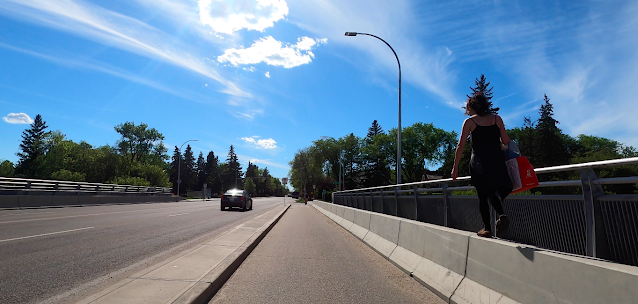Each week, I try to stop and notice three things that I noticed that made me happy or grateful.
There are two parts of that effort—the noticing and the thanksgiving. The conscious noticing stems from the hunch that too much of what I notice is what others want me to notice, and that it is the algorithms they brandish that get me noticing what they want noticed. The preference for making note of what makes me happy or grateful, even if those are small and quiet notes, is a reaction to my sense that it's too loud and too angry out there. Together, it's the work of self-preservation, I suppose.
That is how the Three Things from Edmonton podcast, now in episode 20, happened. It's not a particularly polished podcast production-wise, but, I do the best I can with the stuff that presents itself to me. Like, this week: potatoes, a woman walking on a retaining wall who reminded me of a squirrel on a wire that reminded me that Leonard Cohen is never far away and what the freedom of bicycle riding is made of.
Here are the words and pics:
 |
| Potatoes on their way |
1. Spuds
Shelagh’s brother Michael dropped off a barrel of potatoes-in-soil in our backyard last week, which got me thinking. Tomatoes, cucumbers, lettuce, beans, peas—you can see those vegetables the whole time they’re growing. Beets and carrots and radishes—you get a glimpse of them as they take shape in the soil. Zucchini sprawls everywhere. Zucchini has no shame. But potatoes stay hidden in the ground. Potatoes are miners in their vault until their cool repose is disturbed by a spade or pitchfork. in that instant we become the miners.
 |
| Michael with barrel of potatoes |
The barrel Mike dropped off last week is half full of soil in which the spuds are already growing. When they sprout leaves, I add more dirt. In the fall, I dump the pail onto a tarp, preserve the soil, find the red potatoes in the black dirt, and keep digging. All the way back to the garden behind the house in northeast Edmonton where I grew up. The potatoes were the holdouts. When they were harvested—be careful not to spear one with the pitchfork, like that? Yeah, like that—the garden was done for the year. The potatoes were taken inside and piled in the cold room, which was connected by a doorway to my bedroom downstairs. The cold room was a kind of a cave. It smelled earthy. There was a vent to the outside. Potatoes and I go way back.
 |
| Squirrel in the infrastructure |
2. Squirrels
In our back lane there’s a squirrel that runs along the telephone wires. If the wires were lines on a staff of music, the squirrel is a runaway F note. And then suddenly a full stop. Or it’s a punctuation squirrel, its tail a question mark, and now an exclamation mark. The squirrel goes back and forth like this, along the line, over the little metal boxes and cat’s cradle of wires up there. Is all this twitchy activity work for him, or is it a bit fun, too? Probably a sound evolutionary move, at least. There’s no food up there, but no cats or dogs or cars or trucks, either. That squirrel ran back through my memory on Tuesday as I pedalled home along 102nd Avenue and across the bridge over Groat Road. The bridge has a retaining wall that separates the sidewalk from the bicycle lane. A woman carrying a red shopping bag was walking on the concrete wall. She was steady, she had good balance, one foot in front of the other, eyes ahead. She had done this before, somewhere long ago. Was she up there for a better view? A better view of the past? Or just for a bit of a lark, trying in her way to be free?
 |
| Kevin at Redbike |
3. Steel
Thursday was World Bicycle Day. I took my Miyata out for a spin and remembered Kevin’s answer when I asked him last week why that bike feels like nothing else. It’s so smooth around corners. It was more of a statement than a question, but Kevin, who’s one of the philosopher-mechanics at Redbike, had an answer. It’s the frame, he said factly-of-matter. The high quality steel tubing, he said. Huh, I said. The freedom and joy so reliably delivered by the bicycle comes from...steel. And from other stuff, including cables, rubber tires and tubes, the chain, spokes, a derailleur, aluminum rims, leather seat—all the apparatus we learn as children to attach to our own frames to become more than we could ever be without them. It’s really no wonder you never forget how to ride a bike. What we learn on that happy day is not independence, but dependence, dependence on matter to get us into the world of spirit for as long as human body and artificial machine stay balanced. That’s unforgettable.
Have a good week.








Comments
Post a Comment